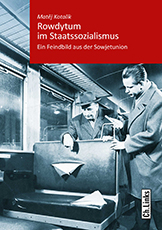Matěj Kotalík
Completed PhD project
The Russian word chuliganstvo (hooliganism), which was originally a term from journalese used to describe bad-mannered and violent behaviour of male youth, became shortly after the Bolshevik October revolution 1917 a catch-all penal category leading to fierce social disciplinary measures. After WWII, the Soviet concepts of chuligan and chuliganstvo were exported to several Central European and East European Soviet satellites, among which also to Czechoslovakia and East Germany. In both states, chuligánství or výtržnictví and Rowdytum as local equivalents of the Soviet concept became part of their penal codes and legal practice, they belonged to the everyday vocabulary of the police as well as to objects of ideologically charged press campaigns.
My Ph.D. project addresses the local application and transformation of the Soviet normative concept chuliganstvo in a non-Soviet context of Czechoslovakia and East Germany between 1956 and 1989. Even though an analysis of the concept concerned is of great importance here, my project goes beyond, focusing also on the comprehension of this one by the actors involved, on the use of the concept in everyday practice, and last but not least on its long-term legitimatory significance.
In more specific terms, the goal of the dissertation is firstly to address the emergence of both national varieties of the hooliganism concept (chuligánství/výtržnictví, Rowdytum), considering their Soviet models as well as native traditions, secondly, to reconstruct the various interpretations and ways of using the concept. Thirdly, the everyday practice of combatting hooligans, the reflection of this struggle by the citizens and a broader impact of this upon political legitimacy in both states shall be considered.
The dissertation has recourse to methodological tools of comparative history, transfer history, Domination as Social Practice (Herrschaft als soziale Praxis) and Eigen-Sinn. For Czechoslovakia and East Germany, archival sources as well as printed sources will be analysed. Especially sources related to law, police and journalism shall be addressed. These three domains are to represent (of course rather in an ideal-typical sense) the interdependence between definition, implementation and reflection of norms.
Publication: Rowdytum im Staatssozialismus Ein Feindbild aus der Sowjetunion, published in the ZZF series "Communism and Society", Oct. 2019, Ch. Links Verlag

